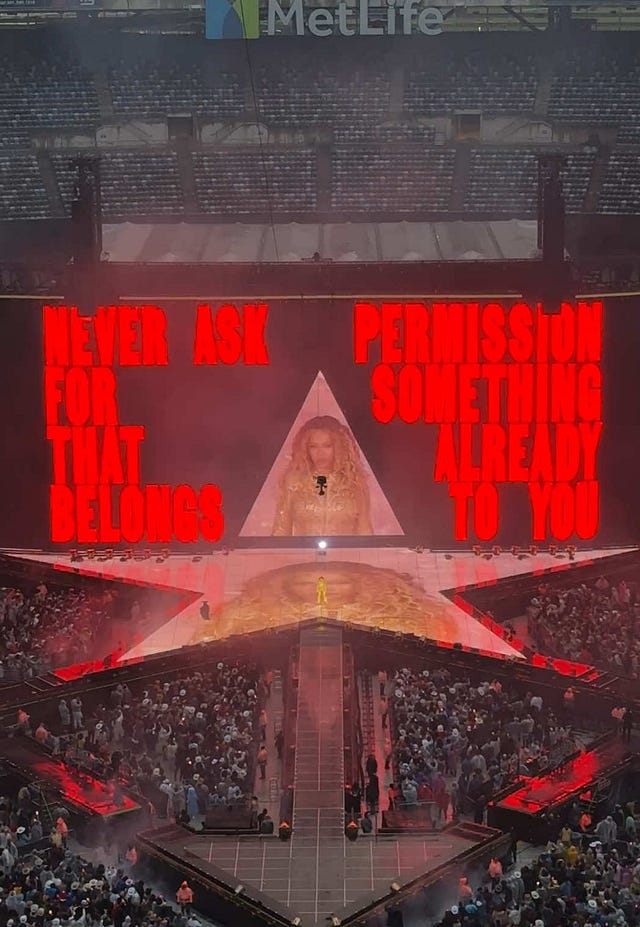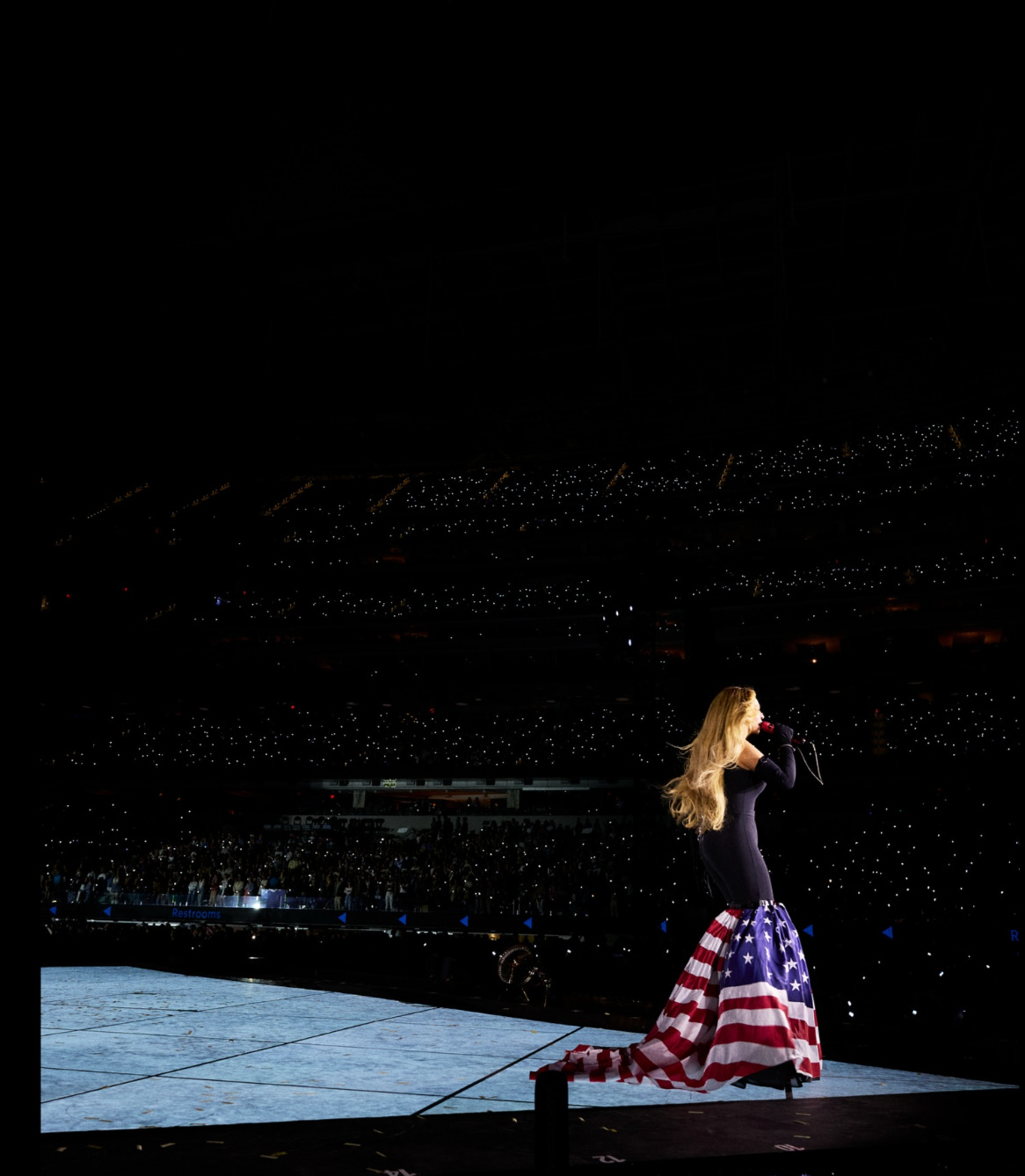On the morning of August 18, 1969, Jimi Hendrix closed out the Woodstock festival with his legendary, improvised rendition of “The Star-Spangled Banner.” His distorted electric guitar mimicked the sounds of bombs, sirens, and screams—transforming the national anthem into a searing commentary on a violent and fractured America. It became a reflection of a nation at war—with Vietnam abroad and itself at home.
Though Hendrix had performed the piece before Dr. Martin Luther King Jr.’s assassination in April 1968, many viewed his Woodstock performance as a visceral response to that tragedy and everything that followed. His anthem became a musical interpretation of the chaos of the era: the brutality of the Vietnam War, the urgency of the Civil Rights Movement, and the widespread political unrest shaking the country’s foundation.
In that single performance, Hendrix captured the hopes and fears of a generation peering into the abyss of an unraveling America.
If you're lucky enough to attend Beyoncé’s Cowboy Carter tour this summer, you’ll witness her own reimagining of “The Star-Spangled Banner.” She sings the lyrics over Hendrix’s guitar—his haunting, defiant version—while a screen behind her flashes in red, white, blue, and black—framing her silhouette in a star.
Then this message appears:
“Never ask permission for something that already belongs to you.”
What follows is “Freedom” a powerful declaration of Black resilience, self-liberation, and the refusal to be confined by systems that were never built for us. It was also the anthem of Kamala Harris’s presidential campaign. I hadn’t been able to listen to that song since her loss in November.
Freedom! Freedom! I can't move
Freedom, cut me loose!
Singin', freedom! freedom! Where are you?
'Cause I need freedom too!
I break chains all by myself
Won't let my freedom rot in hell
Hey! I'mma keep running
'Cause a winner don't quit on themselves
But seeing Beyoncé perform it live changed something in me. It gave the song new meaning. It gave me new meaning. For the first time in a long time, I felt the fire of purpose:
It’s time to reclaim America.
Cowboy Carter as Blueprint
Beyoncé’s Cowboy Carter show offers both inspiration and a blueprint. It’s as entertaining as it is political—unapologetically so. Like all great art, it operates on multiple levels: meeting the audience where they are, then lifting us into a higher stratosphere of reflection, nostalgia, commentary, and hope.
The overarching theme of Cowboy Carter is genre—how it’s constructed, who it excludes, and who it erases. Beyoncé doesn’t just challenge the boundaries of country music; she obliterates them. With this album and tour, she delivers a masterclass in how Black artists have always shaped, built, and redefined American music—especially country. She forces us to reckon with the historical erasure of Black contributions and reclaims space in a genre that was born from Black Southern sounds but whitewashed for mass consumption.
A Few Songs That School Us All
I could write a whole book on this but here are a few songs from the album that school us so hard, we walk away with a PhD in genre, history, and American cultural studies:
“AMERICAN REQUIEM”
The album’s opening track—and the first song performed on tour—isn’t just a song. It’s a thesis.
Nothin' really ends
For things to stay the same, they have to change again
Hello, my old friend
You change your name, but not the ways you play pretend
American Requiem
Them big ideas (yeah), are buried here (yeah)
From there, Beyoncé begins to excavate “them big ideas”—the myths, the erasures, the buried truths of American music and identity. She invites us to confront the stories we’ve been told in history class and instead embrace the full, complicated, often stolen history of not just country music—but the country itself.
“SPAGHETTII”
Opens with Linda Martell, the first commercially successful Black female country artist, declaring:
“Genres are a funny little concept, aren’t they?”
It’s not just a flex—it’s a challenge. The track blends rap, country, and spoken word to blur genre lines and dismantle the gatekeeping that has kept Black artists out of country’s mainstream narrative.
“BLACKBIIRD”
A Civil Rights-era ballad by The Beatles gets the full Beyoncé treatment. Sung by rising Black female country artists—Tanner Adell, Brittney Spencer, Tiera Kennedy, and Reyna Roberts—this version doesn’t just revisit the metaphor, it realizes it. While The Beatles sang about injustice from across the pond, Beyoncé takes the broken wings of history and lets them soar, placing Black women front and center in a genre that has tried hard to shut them out.
“Blackbird singing in the dead of night
Take these broken wings and learn to fly…”
“YA YA”
Beyoncé mashes up everything—psychedelic rock, soul, country, and funk. She samples Nancy Sinatra and nods to Little Richard, drawing a direct line to the Black roots of American rock and roll.
(Many speculate that Act III will be her rock album, following Act I: House and Act II: Country.)
“JOLENE”
You can’t make a country album without tipping your hat to Dolly Parton. But Beyoncé flips the message completely—turning the original’s plea into a warning. Through a Black feminist lens, Jolene becomes a declaration of strength, ownership, and refusal to be diminished.
There are so many more examples—and I’ll keep going if you want me to. But for now, I’ll leave you with this:
Yes, Cowboy Carter opens with an American flag projected on the screen as the audience enters the stadium—a deliberate visual cue that sets the tone for what’s to come. Beyoncé doesn’t just walk onto a stage—she walks into a layered conversation about patriotism, identity, and who owns the American narrative.
Reclaiming America
After attending the Cowboy Carter show, I feel a renewed purpose in my mission to keep teaching the true and complex story of America—by unearthing the hidden histories and stories for my students. I also feel reinvigorated in my fight to reclaim the United States of America.
Just as Beyoncé has reclaimed so many symbols of American identity in this album and tour, we need to do the same.
We need to reclaim the flag.
We need to reclaim patriotism.
We need to remind this country that America belongs to all of us—not just the oligarchs and white supremacists.
We need to show the world not just what we stand against—but what we stand for.
Beyoncé ends “American Requiem”— and the Cowboy Carter show — with:
Goodbye to what has been
Pretty house that we never settled in
A funeral for fair-weather friends
I am the one to cleanse me of my Father's sins
American Requiem
Them big ideas (yeah), are buried here (yeah)
Amen
Let’s say goodbye to the ghosts of our past—not by covering them up, but by facing them. And giving them new life—with purpose, truth, inclusiveness, and liberation.
Amen









Admittedly I’ve been less than a Beyoncé enthusiast; that changed with the Cowboy Carter album. And I like country music but it’s not my favorite genre. I love the outlaw group, the outlier folks who speak for the marginalized people. Beyoncé ‘s outright chutzpah in taking this on, making it her own while highlighting black artists spoke across many dividing lines…Blackbird is my favorite because it takes the song to its origins. I saw Jimi Hendrix in concert (not at Woodstock) and heard him play the Star Spangled Banner. Thank you for sharing this with us. THIS is how we take the flag back. Thank you for pointing this out and bravo to Beyonce!
And she wrote this album first. The truest visionary. This is great writing Sari 🎯